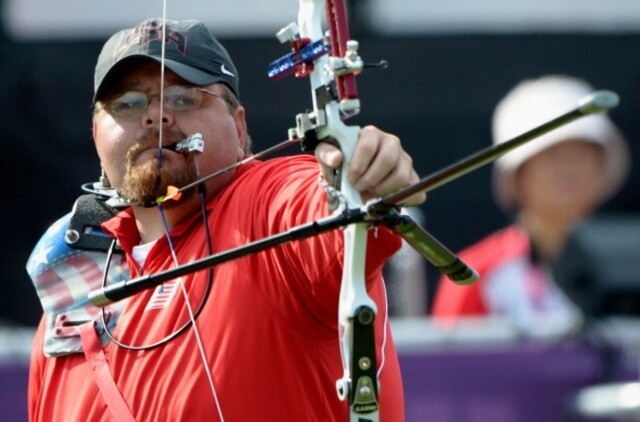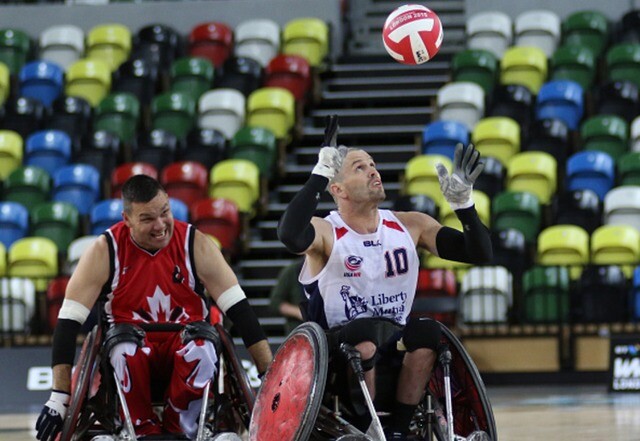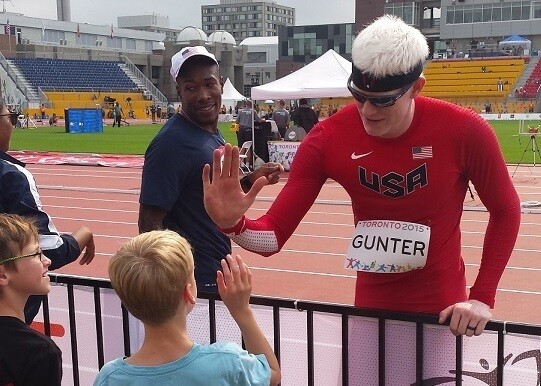Heading to Rio this year following several other LDS athleteswho competed in the 2016 Olympics are several inspiring Paralympic athletes. Learn more about these incredible athletes and how they have overcome difficulties to make it to the 2016 Rio Games.
Eric Bennett: Archery, U.S.
After a terrible car accident when he was a teenager, Eric Bennett had to have his right arm amputated. In the past, Bennett has used a mechanical release attached to a shoulder harness to allow him to compete in the sport he loves: archery.

However, after the 2012 Paralympic Games, the rules changed and Bennett had to find a new way to shoot with one arm. But that hasn't slowed him down.
In the 2012 Paralympics, before the rule change, Bennett finished fourth. In 2015, Bennett won the World Archery Para Championships in Donaueschingen, Germany. And just recently, in May 2016, Bennett earned a Gold Olympian Adult Achievement Award from USA Archery’s Achievement Award Program.
Josh Wheeler: Rugby, U.S.
Josh Wheeler loves to play murderball—the original name for wheelchair rugby. He fell in love after the first hit, and now he's one of the best players in the United States. In 2009, he made the U.S. Quad Rugby Association's developmental national team after just playing for two seasons.

Wheeler has always been active. Growing up, he loved playing basketball, going mountain biking, and playing football. But in 2006, a driver didn't see Wheeler while he was on his motorcycle, turning directly in front of him.
The crash left Wheeler in a coma for a week. It also broke his neck.
Wheeler woke up to find he had no function in his lower body and partial function in his right arm and hand. But he was determined to stay active. Just a year after the accident, Wheeler was out on the field for his first wheelchair rugby game.
A returned missionary who went to BYU, Josh Wheeler competed in the 2012 Olympic Games and won first in the 2013 World Wheelchair Rugby Challenge and third in the 2014 World Championships.
Jason Smyth: Track and Field, Ireland
At 9 years old, Jason Smyth was diagnosed with an eye disease that reduces his vision, but that hasn't stopped him from pursuing his passion. Though unable to serve a traditional LDS mission, Smyth says, "Instead I have been blessed with a talent that takes me all over the world and allows me to meet many different people. I try to use these opportunities to share some of the things I know through interviews, public speaking events, and by sharing my beliefs with the people I meet."
In the 2008 Beijing Paralympic Games, Smyth broke two world records and took home gold in the 100m and 200m. In his very next Paralympic appearance in 2012, Smyth accomplished the same incredible feat, breaking both world records and bringing home two more golds in the 100m and 200m, earning the title of the fastest Paralympic athlete ever. Now, Smyth is gearing up for his third Paralympic appearance.
Tyson Gunter: Track and Field, U.S.
Tyson Gunter has albinism. As a result of his condition, his vision is limited and his depth perception is virtually non-existent. After an LDS mission to Washington, he walked on to the track team at Idaho State University. After college, Gunter made his presence felt on the international stage. In 2013, he won the silver medal in the high jump at the Paralympic World Championships in Lyon, France. Two years later, he won the silver medal in the long jump at the Para Pan America Games in Toronto, Canada.

Image courtesy of Tyson Gunter.
However, The International Paralympic Committee recently elected to remove jumping events for Gunter's class (T13 limited vision), which meant that if Gunter wanted to compete in Rio, he couldn't get there as a jumper. Instead, he had to qualify as a sprinter for the 100m and 400m—the latter of which he describes as "one of the most hated events in all sports."
No matter what he's facing, however, Gunter always places his faith first. "The gospel has influenced everything in my life," Gunter says. "I think that is the whole goal, to live the gospel and not just go to church . . . I don't do everything perfectly, of course, but I always try to consider my decisions based on the lifestyle that the gospel teaches."
Ann Yoshida: Canoe/Kayak, U.S.
When a car ran a light, slamming into the side of the car Ann Yoshida was riding in, Yoshida was left paralyzed and with a brain injury that required her to be placed in a medically induced coma.
Months later, Yoshida awoke only to find that she couldn't speak; she had to begin using sign language to communicate.
An athletic and competitive person, Yoshida wasn't discouraged by this new challenge. Relying on her spirituality, she quickly began doing all of the things she loved to do before: talking, tennis, racing, surfing, outrigger canoeing, off-road hand-cycling, paddle boarding, painting, and traveling.
Now, Yoshida is competing in the 2016 Paralympics in Rio. Outside of competing, Yoshida is also pursuing a doctoral degree in Occupational Therapy at Pacific University and devotes her time to rehabilitating others who have been injured and making her community more inclusive for people of all abilities.
David Blair
When David Blair was born, doctors said he would never walk. Born with a club foot, Blair had to endure multiple surgeries and endless hours of physical therapy at a young age in order to prove his doctors wrong.
In high school, Blair began competing in field events, finding out he had a gift for the hammer throw and discus. After winning his high school state championship, Blair earned a scholarship to Weber State University, where he set multiple school records and won two conference titles.

Image from teamusa.org.
After college, Blair moved on to become a database programmer with a wife and four daughters. It wasn't until 2012, when he watched runners competing in the Paralympic Games, that Blair began considering competing once more.
At 40 years old, Blair began training early in 2015 to compete in the discus after a 16-year absence in the sport. By the end of 2015, he had a silver in the world championships. By May of this year, he broke the world record. Now, Blair looks forward to testing that new record at the 2016 Paralympic Games.
Brickelle Bro

Image from paralympic.org.
After being born with fibular hemimelia and amniotic band syndrome, Brickelle Bro had to have both her legs amputated below the knee.
Yet, that hasn't stopped her from setting the S8 American Paralympic record—twice.
Though Bro tried several sports using prosthetic legs, she found her element was water.
"I think Brickelle grew to like swimming because she felt so free in the water," says Bro's mother, Heather. "It was the great equalizer. She was able to move as fast as her friends and peers and get around and play."
At 15, Bro made the London 2012 Paralympic team, placing 5th in the 400-meter freestyle. Now, Bro is back for the 2016 Paralympic Games, ready to represent her country and show that, in the water, she has no limits.
Images, unless specified, from Getty Images.



